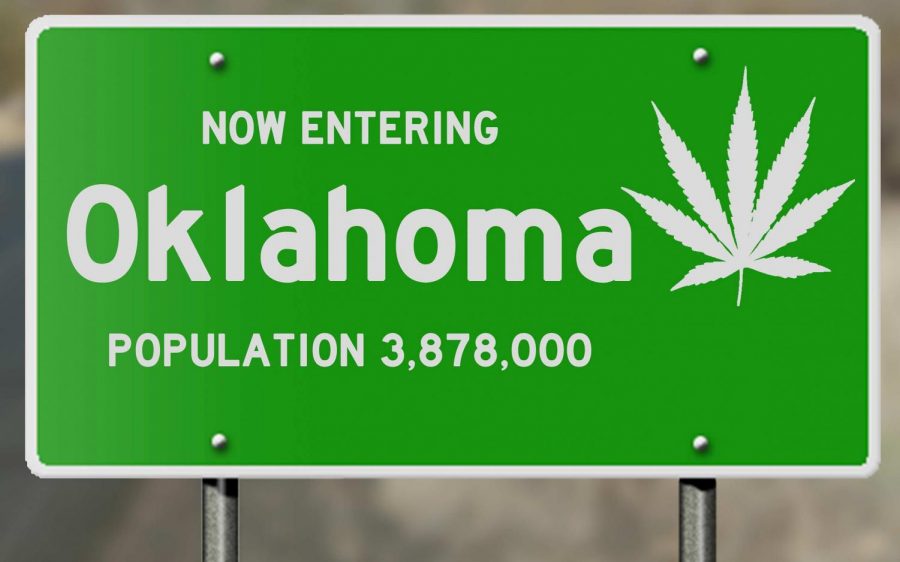Oklahoma activists submit cannabis legalization proposal to qualify for 2020 ballot
A measure that could potentially legalize recreational cannabis in Oklahoma has been sent to the Secretary of State’s office. The proposal ballot title, which is being funded by local pro-cannabis groups and a national political action committee, was submitted on Thursday, December 12.
This campaign represents the first step towards getting cannabis legalization on Oklahoma’s 2020 ballot. Cannabis is already legal in the state for medical purposes; following the passing of a ballot measure in 2018.
Filed as State Question 806, the measure was submitted by Oklahoma City residents Amy Young and Vanessa Brandon Avery.
SQ 806 is “exploring the initiative petition process right now to determine the feasibility of letting Oklahomans vote and decide this important issue as early as next year,” said Young.
In the event that Oklahoma’s recreational cannabis bill is approved, the activists who are pushing for legalization must collect 178,000 qualifying signatures within a 90-day period.
“We have seen all across Oklahoma, from our cities to our rural areas, the widespread support among our voters to regulate and tax adult [cannabis] use,” Young said in a press release. “The status quo wastes law enforcement resources that would better be spent fighting serious crimes. It’s time to let the people decide this issue.”
Oklahoma’s adult-use cannabis program would be merged with the state’s Medical Marijuana Authority
Currently, Oklahoma’s medical cannabis market is overseen and regulated by the state’s Medical Marijuana Authority. If the 2020 ballot measure to legalize recreational cannabis is approved by voters, the agency will be renamed to accommodate the adult-use program. Its new name would be the “Oklahoma Marijuana Authority.”
Since medical cannabis legalization went into effect back in 2018, an impressive 220,000 patients have already registered for enrollment in Oklahoma’s medical cannabis system. Registered patients can obtain their medicine from licensed dispensaries scattered around the state; approximately 1,500 licenses have been issued among dispensary owners to legally sell pharmaceutical-grade cannabis in Oklahoma.
Based on the details of SQ 806, adults aged 21 and above will be legally allowed to possess, grow and buy cannabis from licensed retailers statewide. Oklahoman’s would be able to cultivate a maximum of six plants for personal use and possession would be limited to one ounce. Also included in the bill is language pertaining to the expungement opportunities that would transpire for individuals with previous cannabis-related convictions.
The activists who filed SQ 806 believe that the state of Oklahoma could reap the financial rewards of legalizing and regulating adult-use cannabis. They have a point, considering the fact that a 15 percent excise tax will be imposed on cannabis sales if the plant is legalized for recreational purposes. The tax rate would be used to cover the cost of launching a recreational cannabis market in Oklahoma, as well as to provide funding for drug treatment programs, public service programs and schools.
National group that contributed to Florida’s legalization supports Oklahoma’s recreational cannabis legalization measure
A group called New Approach PAC is backing efforts to legalize recreational cannabis in Oklahoma. The state’s pro-pot measure will undoubtedly benefit from having New Approach PAC’s backing; the organization supported Florida Amendment 4, which gained approval from voters in 2018.
This 527 nonprofit organization was established back in 2014. Headquartered in Washington DC, the advocacy group contributed cannabis legalization campaign funding to the amount of $6,937,500 between the years 2014 and 2018.
According to campaign manager Michelle Tilley, no other national group is providing funding for Oklahoma’s recreational cannabis legalization proposal.
“Other states have successfully legalized [cannabis], and Oklahoma would greatly benefit from this change in policy as well. Our state is ready for this common sense approach,” Tilley said, adding that, “we can remove [cannabis] from the unregulated market and put it behind the counters of regulated businesses.”










